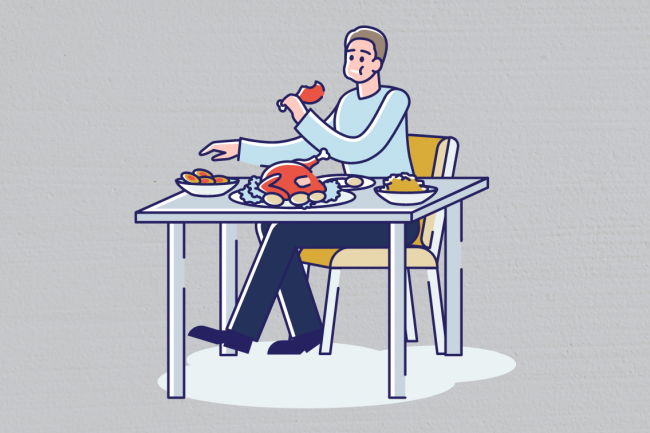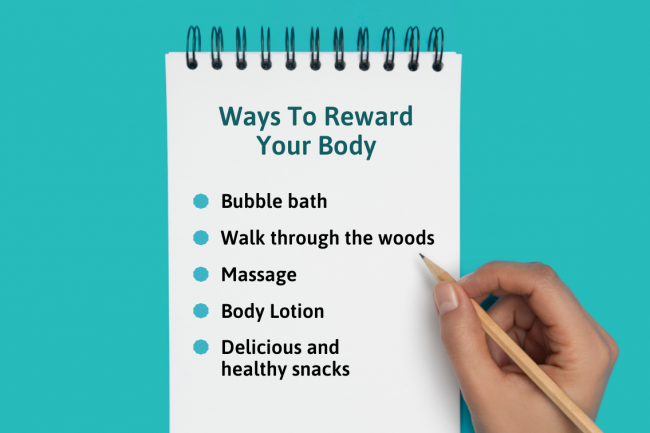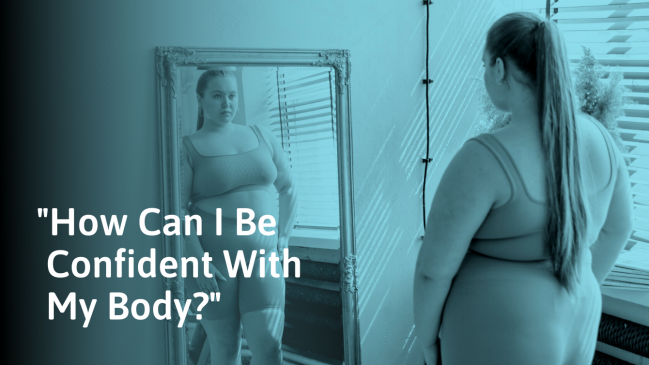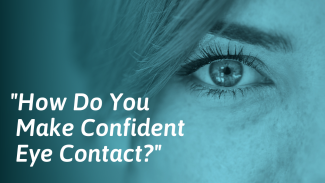Body confidence is a strange concept. Very young children seem to have it instinctively. They don’t worry about whether their bodies are “right” or “wrong,” so long as they can be happy and comfortable. They realize that they’re beautiful. Sadly, by the age of 7 or 8, this confidence is often lost, and many of us are working hard as adults to regain it.[1]
Luckily, it is possible to start to feel pride, and even love, for your body. Here are the best ways to make a lasting change to your body image and boost your overall self-confidence as well.
How to be confident in your body
Being more body confident isn’t about hitting the gym or losing a few pounds. Confidence is based on how you think about yourself rather than your objective appearance or body composition.[2] The good news is you can change how you think.
Here are the best ways to feel confident in your body.
1. Understand your beliefs about your body
Often, it isn’t how we look that undermines our body confidence. It’s what we believe it says about us as a person.[3] Understanding your beliefs about your body and changing ones that hurt you can boost your body confidence.
Your beliefs about what your appearance means are often based on moral or value judgments, for instance, that personal grooming is a sign of self-respect.
These beliefs aren’t necessarily true. For example, there’s no relationship between shaving your legs and self-respect or between your weight and your self-control.
Cognitive-behavioral therapy (CBT) helps us adjust beliefs that aren’t helpful for us.[4] One strategy is to find a competing belief and try to find evidence for that. For example, if you believe that no one will love someone overweight, try to notice overweight people in relationships. The more evidence you find, the easier it is to realize that weight doesn’t stop you from being loved.
Tip: Challenge beliefs about others
Try to cultivate a similar attitude to other people’s appearance. When you see people in the street, notice any value judgments you make about them based on how they look. Challenge those assumptions, whether they’re positive or negative. This can help create a healthier mindset around body image and self-worth.[5]
Tip: Challenge beliefs that stop you from doing things you want to do
There may be things you tell yourself you can do “Once I lose 5 pounds” or whatever you tell yourself will “fix” your body. There’s nothing stopping you from doing those things now. You can find love, wear a bikini, get a new job, travel the world, or do whatever you want to do exactly as you are.
If you’re telling yourself that there are things you can’t do because of how you look, try to prove yourself wrong. Take the smallest, least scary thing that you’ve been putting off and give it a go. If it goes well, ask yourself what else you could try.
2. Change your inner monologue
Be aware of how you speak to yourself about your body. You are probably your own worst critic. Many of us say things to ourselves that we wouldn’t dream of saying to someone else, especially not someone we cared about.[6]
If your inner monologue is harsh, ask whose voice you are hearing. You might realize you’re repeating things you were told in the past by people who wanted to hurt you.
When you start beating yourself up, practice realistic, positive self-talk. You might find it helpful to speak out loud. You could say “Stop. That isn’t kind.” then ask yourself what you’d say to someone you loved. Saying kind things to yourself can remind you that it’s OK to love yourself.
3. Appreciate yourself without comparison
We make comparisons between ourselves and others every day. Comparisons aren’t always unhealthy. Comparing ourselves honestly to our friends and colleagues can help motivate us or boost our self-esteem.[7]
Unfortunately, we compare ourselves to more than those around us. We compare ourselves with acquaintances on social media, influencers, and celebrities. Not only that, we compare our “normal” selves with other people’s highlights.
Comparing our bodies to online images sets us up to feel bad. The worst part of comparing yourself to others is that you miss the opportunity to see the beauty, strength, and power in yourself.
Look for things you can appreciate about your body without making comparisons. These are things that you’d appreciate even if someone else was “better” at it than you. You might have graceful fingers, heal quickly from injuries, or fit perfectly into your favorite chair.
4. Focus on what your body can achieve
When we think about our bodies, we tend to think about our appearance. Social media is full of images, and even the majority of our conversations about our bodies focus on our appearance.
Try to move your inner monologue away from the way you look and towards what you achieve. This can be particularly difficult for plus-size people, who are constantly confronted with other people’s beliefs about how they should look and what they can do.
You don’t have to aim for perfection or run a marathon to value what your body can achieve. It might be as simple as being happy to be able to walk to the store or enjoy stroking a random cat you pass by.
Try to change the way you think about your body from something to be looked at to it being the way you interact with the world.
This can be ableist. People with disabilities (visible or invisible) often feel let down by their bodies and struggle to “appreciate what your body does for you.”[8] That’s OK. Be kind to yourself, especially when you feel betrayed by your body. It’s completely OK to be angry about what your body is stopping you from doing. It’s also OK to feel both grateful for what your body can do and resentful for what it can’t at the same time.
You might like this article on how to get a confident body language.
5. Find other ways to boost your self-esteem
There is a strong relationship between overall self-esteem and body confidence.[9] Feel better about your body by improving your self-confidence.
Look for other things that make you feel good about yourself, and remind yourself of them when you’re struggling with your body image. If you can, try asking others what they value about you. They will rarely mention your looks.
Improving your self-esteem probably won’t happen quickly, but it brings other benefits, such as more confident body language and feeling happier or more secure in relationships.[10] Check out our guide on how to build your self-esteem.
6. Work towards body neutrality
Body positivity is about trying to love your body, however it looks. That can be unrealistic for some people, especially those with anxiety or depression, who may beat themselves up for “failing” to love their bodies.[11]
Body neutrality is a good alternative. It emphasizes that our bodies are only one part of ourselves—and usually not even the most important part.
Work towards body neutrality by being honest about how you feel about your body. Don’t force yourself to be positive or confident about your body. Instead, accept that your feelings are OK. This reduces the pressure on you to love yourself all the time and can make it easier to deal with negative feelings. This can be especially helpful for transgender or non-binary people.[12]
7. Create a healthy relationship with social media
People often talk about taking care of how they feed their bodies. For body confidence, try to take care about how you feed your mind and spirit as well.
Social media can help you stay connected to people in your life, but it can also feed insecurities about your body.
Remove social media (and mainstream media) that don’t leave you feeling good. Be aware that other people talking badly about themselves can reduce your body confidence through emotional contagion.
Understand influencers’ pictures
An influencer’s “mirror selfie” is typically taken using high-quality cameras and lights. The phone is only a prop to make the picture appear unstaged. They then use filters and editing software to make their pictures “perfect.” Even their poses create unrealistic expectations.
Try to see influencers’ pictures as more of a magic trick than something to aspire to in everyday life.
8. Choose clothes that make you happy
Lots of fashion advice (especially for women) includes telling us the right clothes for our body type and how to hide our “imperfections.” Although this is (usually) well-intentioned, it rarely helps to increase your body confidence.
Trying to disguise parts of your body just focuses your attention on your perceived “flaws.” You can start to feel shame, believing that parts of yourself need to be hidden. Instead, try focusing on clothes that make you happy, whether that’s cheerful colors, crazy patterns, or really nice textures.
It’s also good to wear clothes that fit well, rather than forcing yourself into outfits that are too tight. We’ve moved away from corsets and bustles, but there are still plenty of clothes that leave us uncomfortable and feeling bad about our bodies. You don’t have to wear them.
Although it might be scary at first, choosing your clothes based on comfort and how well they express your personality can help build your body confidence.
9. Consider intuitive eating
For many of us, intuitive eating is a completely different way of thinking about food. It’s often described as an “anti-diet.”

Intuitive eating aims to create a healthy relationship with food and to replace the unhealthy beliefs and habits you may have picked up from diet culture.
You are encouraged to listen to your body and eat the foods that will nourish you physically and emotionally. No foods are considered “bad,” and you can eat anything you like as part of a healthy lifestyle. Pay attention to what you are eating, and stop when you are satisfied, even if that means wasting food.[13]
Although intuitive eating can be revolutionary, it’s not suitable for everyone. It isn’t a diet and isn’t advised if your health could be put at risk by gaining weight.
10. Learn how you like to move
We often think of exercise as something we do to change our bodies. It can feel like a punishment or something we have to suffer through.
In reality, movement can feel really good, and it’s an important part of healing our relationships with our bodies. Try to find enjoyable ways of getting more activity into your life.
This might be dancing (at a club, in a class, or around your kitchen), walking, gardening, or anything else that feels good. Choose something that you enjoy for its own sake, rather than something to lose weight or tone up.
When you increase your activity levels, you’ll probably feel a little tired or sore. If you pay attention to that feeling, you’ll probably realize that it’s a very different type of soreness than you get from sitting at a desk all day.
As you start to move more, small aches and pains can disappear, and you grow more confident in your body.
11. Find affirmations you actually believe
Affirmations can sound too good to be true because they often are. Making affirmations that you don’t believe can become demotivating as your inner monologue lists reasons that the affirmation isn’t true.[14]
Good affirmations are ones you honestly believe. These might not be as inspirational or look as good on Instagram, but they are more effective at changing your mindset.
For example, saying “I’m the most attractive person in any room” is difficult for anyone to believe. Instead, try “I’m healthier today than I was yesterday, and I’m building a better relationship with my body.”
You may find this article on how to be more positive useful for following this tip.
12. Look at past pictures (with compassion)
If you’ve struggled with body confidence for a long time, it can be helpful to look back at pictures from when you were much younger.
When we look at pictures of our younger selves, we usually see them more positively than we did at the time. You might realize that your flaws were less visible than you believed and see things to be proud of.
You can try to extend this compassion to your current body as well. Try to imagine how you’ll think about your current body in 20 years’ time.
This tip might not work for everyone. If you struggle to feel compassion for your past self, that’s OK. Don’t try to force yourself if this tip doesn’t have the right impact.
13. Treat your body (and yourself) with kindness
When we lack body confidence, we can treat our bodies (and ourselves) harshly. We see our body as an enemy, needing to be overcome. Treating your body harshly will usually lead you to feel worse about yourself rather than better.[15]

Avoid escalating a poor body image and focus instead on ways to reward yourself and treat your body with love and kindness. Try to find things that leave you feeling good about yourself, rather than ‘treats’ that leave you feeling guilty or unhappy. For example, high-sugar foods taste great, but they can sometimes leave you feeling tired and down afterward.[16] Try giving yourself a reward that leaves you feeling good for the whole day.
You might like to read this article on how to build confidence in general.






